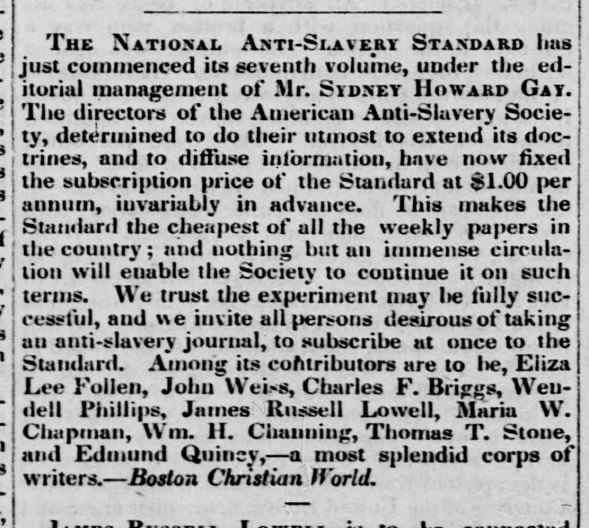"Typee" proved the most successful hit in book-making, since the publication of Stephens's first book of Travels. An English critic said it was "Yankee all over." By which he meant that it was entirely new, fresh, and devil-may-care; free from the dry, stale, and wearisome conventionalities of trained literature. It was a book of itself, not made up of pickings from other books, but from the personal observations and individualities of the author....
--Charles Frederick Briggs, review of Omoo in the National Anti-Slavery Standard for May 27, 1847.
A footnote in the third Norton Critical Edition of Moby-Dick calls attention to the quoted expression "Yankee all over" in remarks by "B." on Melville's first two books in the New York National Anti-Slavery Standard. As first identified by Robert K. Wallace in Douglass and Melville: Anchored Together in Neighborly Style (Spinner, 2005), this "B." who then reviewed books for the Anti-Slavery Standard was Charles Frederick Briggs.

According to Briggs, an unnamed "English critic" had characterized Typee as "Yankee all over," meaning "new, fresh, and devil-may-care." Norton editor Hershel Parker thinks "this reference may yet be discovered" and so it will be, herein.
A book full of fresh and richly coloured matter. Mr. Melville's manner is New World all over.
Briggs could have found Typee described as "New World all over" in numerous places:
- The original review of Typee in the London Athenaeum.
- Reprints of the London review in the New York Anglo American on April 4, 1846; and Littell's Living Age volume 9 on April 11, 1846.
- With excerpts of favorable "NOTICES OF THE ENGLISH PRESS" bound into copies of Omoo (1847).
https://hdl.handle.net/2027/uc2.ark:/13960/t3kw57w1s?urlappend=%3Bseq=407 - Harper & Brothers advertisements in New York newspapers and journals.
Glossing the "epithet" New World as a synonym for American, the English critic referenced "Stephens, the foremost among American pilgrims." In the National Anti-Slavery Standard, Charles F. Briggs similarly compares Melville's debut to that of John Lloyd Stephens, calling Typee "the most successful hit in book-making, since the publication of Stephens's first book of Travels."
Stephens's first big hit was the 1837 book Incidents of Travel in Egypt, Arabia Petraea, and the Holy Land
BY AN AMERICAN.



No comments:
Post a Comment